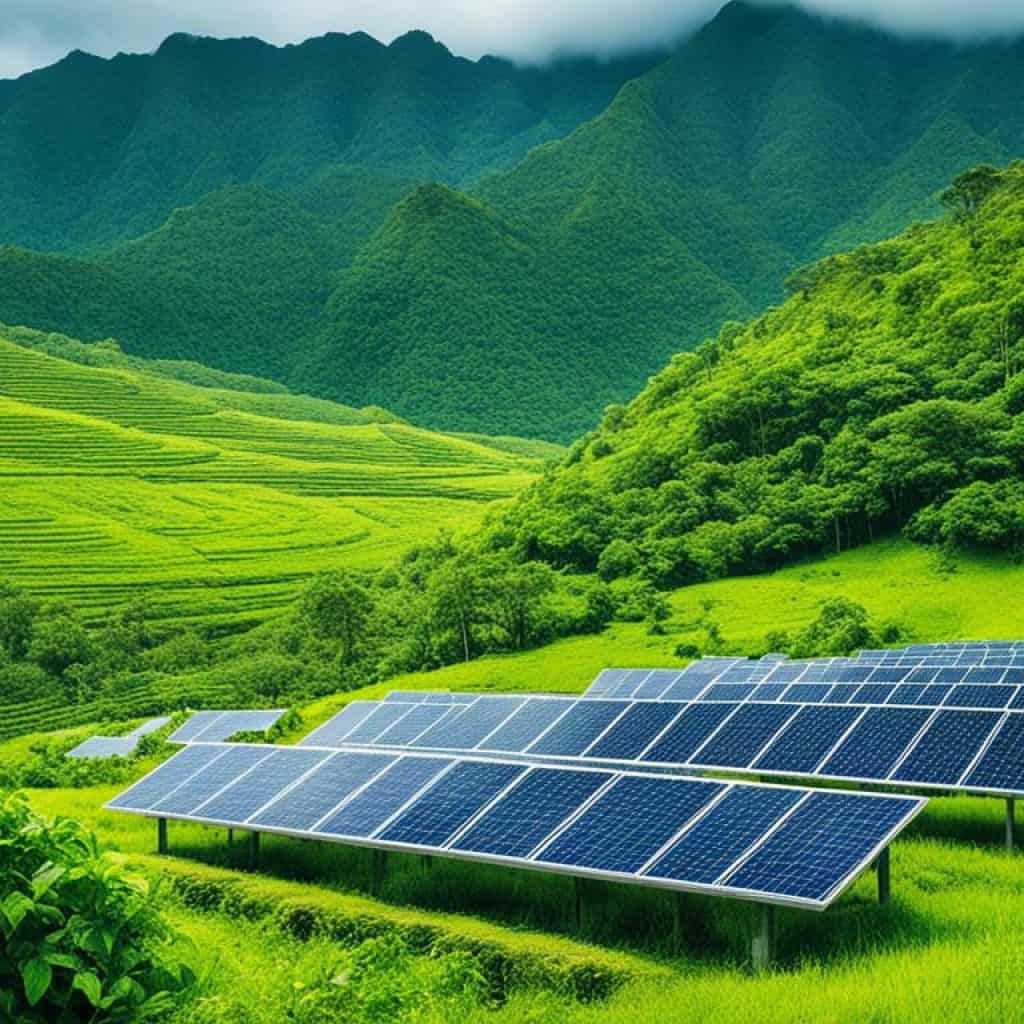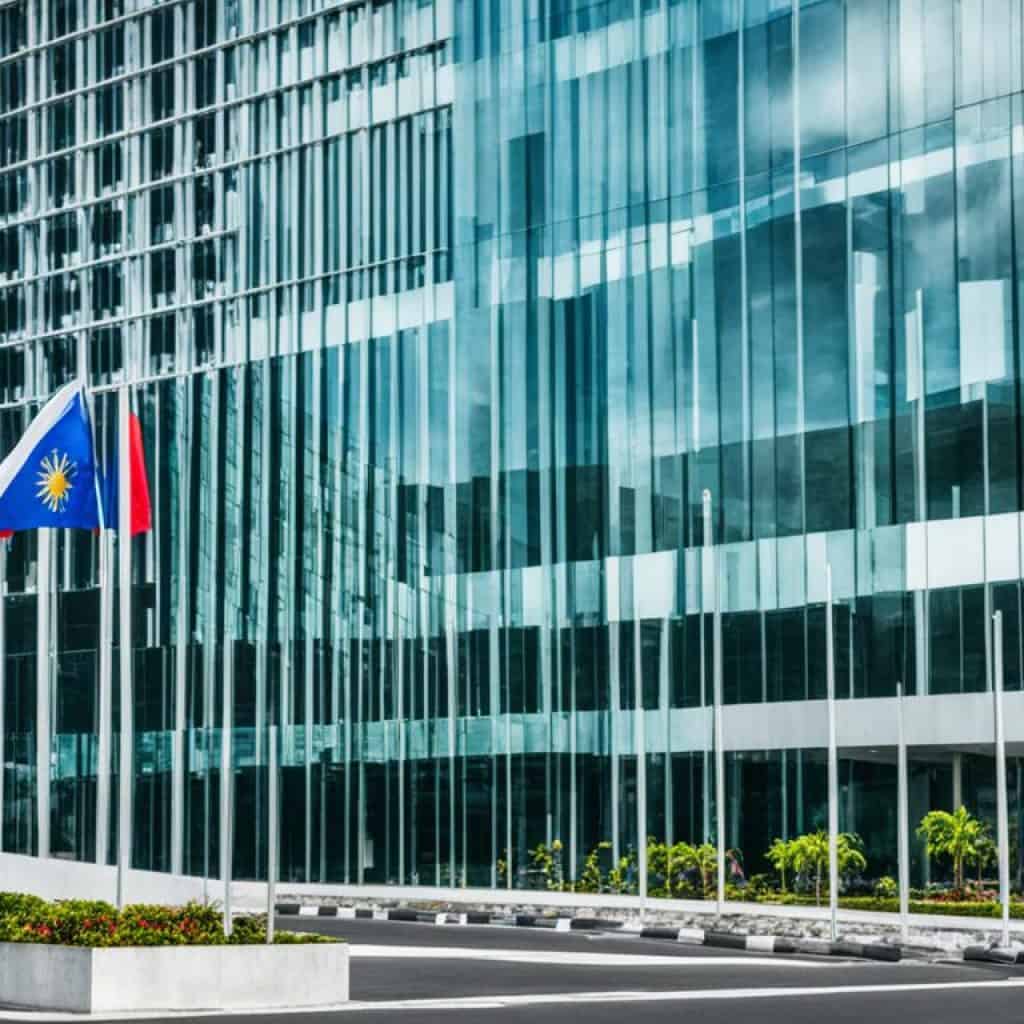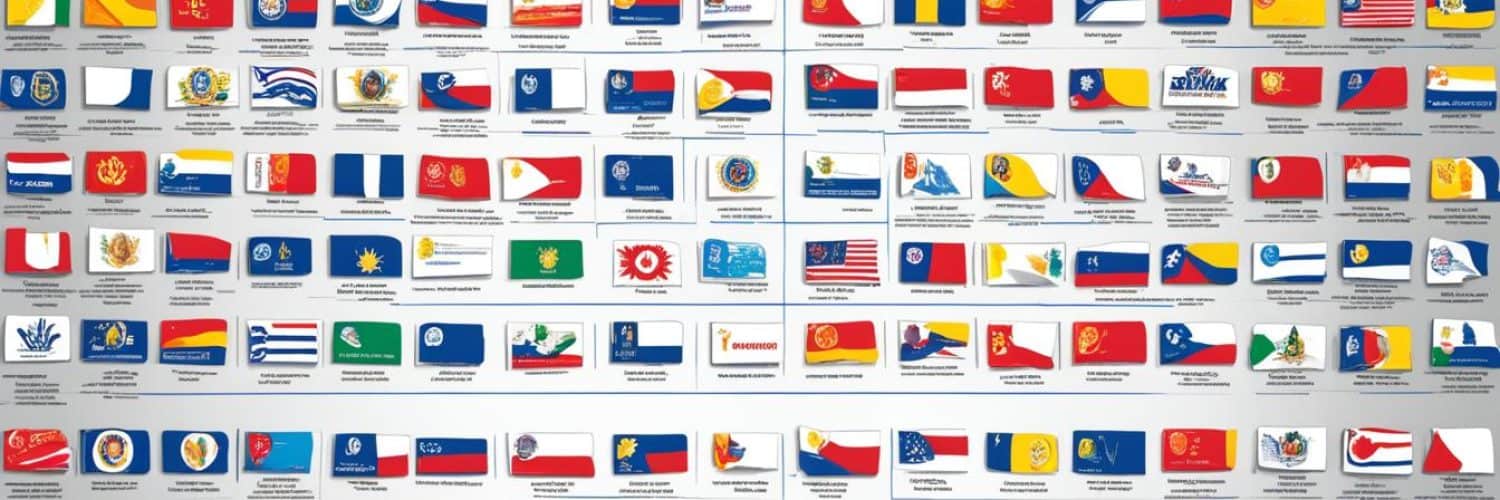Have you ever wondered how the Philippines is governed and administered? Do you know the various departments and agencies that play a crucial role in shaping the country’s policies and regulations? Whether you’re an individual navigating government processes or a business seeking contact details and information, it’s essential to have a comprehensive list of government agencies in the Philippines at your fingertips.
From the Office of the President to the Department of Finance, each agency holds specific functions and responsibilities that contribute to the overall governance of the nation. But can you name all the important government agencies in the Philippines? Do you know what they do and how they impact your life?
Key Takeaways:
- Discover the extensive list of government agencies in the Philippines and their functions.
- Find essential contact details for individuals and businesses engaging with the Philippine government.
- Understand the roles and responsibilities of each agency in shaping policies and regulations in the country.
- Navigate the necessary processes and regulations when interacting with the government.
- Uncover the impact that government agencies have on various aspects of your life and the nation as a whole.
Office of the President
The Office of the President holds the highest authority in the Philippines, overseeing crucial functions such as national defense, foreign affairs, and economic policy. It serves as the central hub of governance and decision-making, ensuring the smooth operation of the Philippine government and the well-being of its citizens.
Comprised of various offices, commissions, and centers, the Office of the President executes its responsibilities with utmost diligence, guided by a commitment to the welfare and progress of the nation. These departments work in tandem to support the President in addressing the pressing issues and challenges faced by the country.
Under the Office of the President, you will find entities such as the Presidential Communications Operations Office, which coordinates the dissemination of accurate and timely information to the public. Additionally, the Presidential Security Group ensures the safety and security of the President, while the Office of the Presidential Adviser on the Peace Process strives to achieve lasting peace and harmony throughout the nation.
The Office of the President serves as a pillar of governance, driving national development and progress. Its multifaceted structure plays a vital role in shaping policies, implementing programs, and ensuring the seamless functioning of the Philippine government.
Office of the President Directory
| Department/Commission/Center | Contact Information |
|---|---|
| Presidential Communications Operations Office | Phone: +63-2-733-2971 Email: pc****@*****ov.ph |
| Presidential Security Group | Phone: +63-2-842-1800 Email: ps*@*****il.ph |
| Office of the Presidential Adviser on the Peace Process | Phone: +63-2-637-6083 Email: in**@*******ov.ph |
Department of Agrarian Reform
The Department of Agrarian Reform (DAR) in the Philippines plays a crucial role in promoting agrarian reform, ensuring land distribution to landless farmers, and supporting agricultural development. With its strong commitment to equitable land distribution and rural development, the DAR strives to create a more inclusive and productive agricultural sector.
The Department of Agrarian Reform consists of various offices, secretariats, adjudication boards, bureaus, and regional offices, each contributing to the achievement of its mission. These entities work collaboratively to implement land acquisition and distribution programs, provide support services to farmers, and facilitate the development of agrarian reform communities.
“The Department of Agrarian Reform is dedicated to empowering Filipino farmers and ensuring their rightful place in society. Through comprehensive agrarian reform programs, we aim to improve the lives of farmers, enhance agricultural productivity, and contribute to the country’s food security.”
– Secretary of Agrarian Reform
With a commitment to social justice and agricultural progress, the DAR plays a vital role in transforming the lives of landless farmers and fostering sustainable rural development. By providing land access and support services, the department enables farmers to maximize their land’s productivity, improve their livelihoods, and contribute to the nation’s overall economic growth.
Through the collaborative efforts of its diverse organizational units, the Department of Agrarian Reform continues to champion the rights of landless farmers in the Philippines, ensuring equitable land distribution and promoting the sustainable development of the agricultural sector.
Key Responsibilities of the Department of Agrarian Reform:
- Implementation of land acquisition and distribution programs
- Provision of support services for agrarian reform beneficiaries
- Development of agrarian reform communities
- Formulation and implementation of agrarian reform policies and programs
- Land valuation and compensation
- Adjudication of agrarian disputes
- Capacity building and livelihood programs for farmers
Department of Agriculture
The Department of Agriculture plays a pivotal role in ensuring food security, agricultural productivity, and rural development in the Philippines. With a vision of a modern, sustainable, and globally competitive agriculture and fishery sector, the department implements various programs and initiatives to support farmers, fishers, and stakeholders in the agricultural industry.
Under the Department of Agriculture, there are several bureaus and offices dedicated to specific areas of focus:
- Bureau of Agriculture and Fisheries Standards (BAFS)
- Bureau of Agricultural Research (BAR)
- Bureau of Animal Industry (BAI)
- Bureau of Fisheries and Aquatic Resources (BFAR)
- Bureau of Plant Industry (BPI)
- National Dairy Authority (NDA)
These bureaus work together to ensure responsible management of fisheries, farming, and natural resources. They provide support in improving agricultural production, promoting sustainable farming practices, and implementing regulations to maintain the quality and safety of agricultural products.
Fisheries and Aquatic Resources
The Bureau of Fisheries and Aquatic Resources (BFAR) is responsible for the sustainable development and management of the country’s fisheries and aquatic resources. BFAR’s programs include:
- Enhancing the productivity and sustainability of aquaculture and mariculture
- Promoting responsible and sustainable fishing practices
- Implementing resource conservation and management measures
- Ensuring the safety and quality of fishery products for domestic and international markets
Agricultural Research and Development
The Bureau of Agricultural Research (BAR) focuses on research and development (R&D) initiatives to enhance agricultural productivity and innovation in the country. BAR’s programs include:
- Conducting research on crops, livestock, fisheries, and agribusiness
- Developing and promoting agricultural technologies and practices
- Providing funding support for R&D projects
- Facilitating collaboration between government agencies, academe, and industry stakeholders
| Bureau | Mandate |
|---|---|
| Bureau of Agriculture and Fisheries Standards (BAFS) | Develop and implement national standards, regulations, and accreditation systems for agricultural and fisheries products and related processes |
| Bureau of Animal Industry (BAI) | Ensure the health and welfare of livestock and poultry, regulate the import and export of animal products, and conduct research on animal diseases |
| Bureau of Plant Industry (BPI) | Promote the development and adoption of improved crop varieties, regulate the import and export of plant products, and ensure the quality and safety of seeds, planting materials, and other agricultural inputs |
| National Dairy Authority (NDA) | Develop and promote the dairy industry in the Philippines, increase local milk production, and ensure the availability of safe and quality dairy products |
The Department of Agriculture, through its various bureaus and programs, plays a vital role in driving agricultural growth, ensuring food security, and promoting sustainable practices in the Philippines. By supporting farmers, fishers, and stakeholders in the agricultural sector, the department contributes to the overall development and prosperity of the nation.

Department of Budget and Management
The Department of Budget and Management (DBM) plays a crucial role in managing the national budget and fiscal policies of the Philippines. As one of the key Philippine government institutions, the DBM is responsible for overseeing the allocation of funds to different government agencies, bureaus, and regional offices. By ensuring the effective and efficient use of public resources, the DBM contributes to the overall development and progress of the country.
The DBM operates with the objective of maximizing the impact and outcomes of government spending. It employs a systematic approach to budget preparation, execution, and monitoring, in line with the government’s strategic priorities. This commitment to transparency and accountability is essential for fostering public trust and confidence in the Philippine government’s financial management.
The DBM is responsible for various functions, including the preparation and distribution of the National Expenditure Program (NEP) which outlines the government’s proposed budget for the upcoming fiscal year. Through meticulous analysis and consultation, the DBM ensures that the allocated funds align with the priorities of different government agencies and programs.
| Functions | Responsibilities |
|---|---|
| Budget Formulation |
|
| Budget Execution |
|
| Budget Accountability |
|
The DBM also plays a vital role in developing and implementing fiscal policies that promote economic stability and sustainability. By striking a balance between revenue generation, expenditure management, and debt sustainability, the DBM contributes to the country’s economic growth and resilience.
In a rapidly evolving political, social, and economic landscape, the DBM remains committed to its core mission of allocating resources efficiently and effectively. By providing strategic guidance and promoting financial discipline, the DBM helps shape the Philippine government’s long-term vision and enhances its capacity to deliver essential public services to the Filipino people.
Department of Education
The Department of Education in the Philippines is dedicated to ensuring quality education for all, from primary to tertiary levels. With a vision of “accessible, relevant, and liberating education for all Filipinos,” the Department of Education strives to empower students and educators through various offices, bureaus, services, regional offices, and learning centers.
The Department of Education’s primary role is to develop and implement educational policies, programs, and initiatives that align with global standards and cater to the diverse needs of Filipino learners. They work tirelessly to provide equitable access to education, enhance learning outcomes, and promote lifelong learning.
Recognizing the importance of a well-rounded education, the Department of Education emphasizes not only academic excellence but also the holistic development of students. They promote values education, arts and culture, sports, and physical fitness to foster the all-around growth and well-being of learners.
Furthermore, the Department of Education places a strong emphasis on professional development for educators. They provide support, training, and resources to enhance the skills and competencies of teachers, administrators, and staff members, enabling them to deliver the best educational experience possible.
The Department of Education is also committed to ensuring inclusive education for learners with special needs. They strive to create a supportive and inclusive environment where every student can thrive, regardless of their abilities or disabilities.
Through their regional offices, the Department of Education works closely with schools and stakeholders at the local level to address specific educational challenges and implement localized solutions. This close collaboration enables them to tailor their programs and initiatives to the unique needs and contexts of different communities.
Whether you are a student, parent, educator, or educational institution, the Department of Education is here to provide guidance, support, and resources. To learn more about their programs, upcoming events, or seek assistance, please explore the contact details below:
| Office/Service | Contact Details |
|---|---|
| Department of Education Central Office | Address: Meralco Avenue, Pasig City, 1600 Philippines Phone: (02) 8633-7208 / (02) 8633-7209 Email: in**@*******ov.ph |
| Regional Offices | Visit the Department of Education website for contact details of the regional offices. |
| Educational Institutions | Contact your respective regional or division office for information and assistance. |
For further information about the Department of Education and their initiatives, visit their official website: www.deped.gov.ph.
Department of Energy
The Department of Energy plays a crucial role in managing energy resources, promoting energy efficiency, and ensuring an adequate energy supply in the Philippines. Its diverse range of offices, bureaus, divisions, and geographical offices work collectively towards sustainable energy development and safeguarding consumer welfare.
The Department of Energy strives to:
- Promote renewable energy sources and reduce dependence on fossil fuels.
- Develop policies and programs to enhance energy efficiency and conservation.
- Facilitate the exploration, production, and distribution of energy resources.
- Ensure a reliable and resilient energy infrastructure.
- Regulate the energy sector to protect consumers and ensure fair competition.
- Collaborate with international organizations to foster energy security.
Through strategic planning and comprehensive initiatives, the Department of Energy aims to achieve a sustainable and affordable energy future for the Philippines.

| Office | Bureau/Division | Geographical Office |
|---|---|---|
| Office of the Secretary (OSEC) | Electric Power Industry Management Bureau (EPIMB) | Luzon Field Office (LFO) |
| Energy Policy and Planning Bureau (EPPB) | Oil Industry Management Bureau (OIMB) | Visayas Field Office (VFO) |
| Renewable Energy Management Bureau (REMB) | Energy Utilization Management Bureau (EUMB) | Mindanao Field Office (MFO) |
Department of Environment and Natural Resources
The Department of Environment and Natural Resources (DENR) is a key Philippine regulatory body responsible for the management of the environment, natural resources, and land use throughout the country. With its commitment to environmental preservation, the DENR plays a crucial role in ensuring the sustainable development and responsible management of the Philippines’ natural resources.
The DENR operates through various offices, bureaus, regional offices, and councils that work together to safeguard the environment and promote responsible resource management. These entities collaborate in implementing policies, programs, and projects aimed at protecting ecosystems, conserving biodiversity, and enhancing environmental quality.
The DENR’s mandate encompasses diverse areas, including forestry, protected areas, biodiversity conservation, environmental impact assessment, land management, and pollution control. By enforcing laws and regulations, conducting research and monitoring, and providing technical assistance, the DENR aims to strike a balance between resource utilization and environmental conservation.
The DENR’s efforts are guided by its commitment to sustainable development, ensuring that the utilization of the Philippines’ natural resources aligns with long-term ecological balance and the needs of present and future generations.
Department of Finance
The Department of Finance is a vital government department in the Philippines responsible for handling fiscal and monetary policies, revenue collection, and economic planning. Its primary objective is to ensure sound financial management and facilitate economic growth throughout the country. With a diverse range of offices, bureaus, divisions, and functional groups, the Department of Finance works tirelessly to maintain a stable and prosperous financial environment.
- Office of the Secretary: Responsible for formulating and implementing financial policies, strategies, and programs that promote economic development.
- Bureau of Internal Revenue (BIR): Tasked with collecting taxes and ensuring compliance with tax laws, contributing to the government’s revenue stream for socioeconomic development.
- Bureau of Customs (BOC): Safeguards the country’s borders by facilitating trade, collecting customs duties, and preventing illegal importation and exportation of goods.
- Bureau of the Treasury (BTr): Manages the national government’s finances, including borrowing activities, bond issuances, and other debt instruments.
- Bureau of Local Government Finance (BLGF): Supports local government units in managing their finances, promoting transparency, accountability, and fiscal sustainability.
- National Tax Research Center (NTRC): Conducts research and analysis to guide tax policy formulation and provide recommendations for effective revenue generation.
The Department of Finance plays a crucial role in steering the country’s economic progress and ensuring the efficient use of public resources. By fostering a conducive financial environment, it contributes to the overall development and well-being of the Philippines and its people.
| Department of Finance Offices | Mandate |
|---|---|
| Office of the Secretary | Formulates and implements financial policies, strategies, and programs |
| Bureau of Internal Revenue (BIR) | Collects taxes and ensures compliance with tax laws |
| Bureau of Customs (BOC) | Facilitates trade, collects customs duties, and prevents illegal importation and exportation of goods |
| Bureau of the Treasury (BTr) | Manages the national government’s finances, including borrowing activities and bond issuances |
| Bureau of Local Government Finance (BLGF) | Supports local government units in managing their finances |
| National Tax Research Center (NTRC) | Conducts research and analysis to guide tax policy formulation |
Department of Foreign Affairs
The Department of Foreign Affairs (DFA) is an essential Philippine government office responsible for managing the country’s foreign relations and representing the Philippines on a global scale. The DFA plays a significant role in promoting diplomatic ties and safeguarding the welfare of Filipino citizens residing overseas.
The DFA operates embassies, consulates, and diplomatic missions worldwide, providing consular and passport services to Filipinos abroad. Whether it’s obtaining a travel document, seeking assistance in times of crisis, or engaging in bilateral and multilateral relations, the DFA serves as the primary contact for Filipinos abroad and foreign governments.
The Department of Foreign Affairs works tirelessly to bolster international cooperation, foster goodwill, and safeguard the rights and interests of Filipino citizens across the globe.
Through its various diplomatic offices, the DFA extends assistance to Filipino communities worldwide, ensuring their welfare and addressing their concerns. The department also plays a vital role in promoting Philippine culture, heritage, and economic interests abroad.
Services provided by the Department of Foreign Affairs:
- Issuance of passports and travel documents
- Consular services for Filipinos abroad
- Assistance to overseas Filipino workers (OFWs)
- Visa processing and facilitation
- Foreign relations and diplomatic engagements
Reach the Department of Foreign Affairs:
For more information or to contact the Department of Foreign Affairs, refer to the following:
| Website | Contact Number |
|---|---|
| www.dfa.gov.ph | +63 (2) 8 834 4000 |
Stay connected with the DFA through its official website and social media platforms to receive the latest news, updates, and announcements.
Image:

Department of Health
The Department of Health (DOH) is a vital Philippine government institution responsible for safeguarding public health, implementing disease prevention programs, and ensuring the delivery of quality healthcare services to the Filipino people. Committed to promoting the well-being of all citizens, the DOH collaborates with various offices, bureaus, hospitals, and councils to address nationwide health concerns and drive public health initiatives.
Under the umbrella of the DOH, several offices work in synergy to fulfill its mission:
- Office for Health Regulations: Focuses on regulatory activities related to the licensing, accreditation, and quality assurance of healthcare facilities and services. It also monitors and investigates disease outbreaks, ensuring the safety and well-being of the population.
- National Center for Health Promotion: Devoted to promoting healthy lifestyles and raising awareness about preventive measures through campaigns, advocacy programs, and community engagement. The center’s efforts aim to empower individuals to make informed decisions to protect and improve their health.
The DOH, together with its network of hospitals and healthcare facilities, strives to provide accessible, affordable, and equitable healthcare services. These institutions play a pivotal role in delivering medical care, treatment, and assistance to Filipinos across the nation, especially in disadvantaged areas.
The DOH fosters collaboration and cooperation with local government units, non-governmental organizations, and other partners to achieve its goals of health promotion, disease prevention, and responsive healthcare delivery. Through ongoing initiatives, the department envisions a healthier population and a stronger healthcare system that can effectively address the evolving healthcare needs of the Filipino people.
Department of the Interior and Local Government
The Department of the Interior and Local Government (DILG) is a crucial government body in the Philippines that plays a crucial role in promoting good governance and local autonomy. It oversees various offices, bureaus, commissions, and law enforcement agencies, all working together towards maintaining peace, order, and public safety.
The DILG is committed to ensuring that local government units (LGUs) operate effectively and efficiently, providing essential services and implementing policies that directly impact the lives of Filipino citizens. It works closely with LGUs to strengthen their capabilities, improve public service delivery, and enhance local governance.
The Department of the Interior and Local Government is dedicated to empowering LGUs and fostering participatory democracy. Through its programs and initiatives, it aims to guide LGUs in the formulation and implementation of policies that address the needs and priorities of their respective communities.
The DILG also oversees law enforcement agencies such as the Philippine National Police (PNP) and the Bureau of Fire Protection (BFP). These agencies strive to maintain peace and order, ensure public safety, and respond promptly to emergencies.
Additionally, the DILG works towards building resilient communities, especially in the face of natural disasters and crises. It collaborates with LGUs to develop disaster and risk reduction management strategies, implement sustainable development practices, and provide assistance and support in times of calamities.
By promoting good governance, local autonomy, and public safety, the Department of the Interior and Local Government plays a vital role in shaping the Philippines’ overall development and ensuring the well-being of its citizens.
| Offices | Bureaus | Commissions | Law Enforcement Agencies |
|---|---|---|---|
| Office of the Secretary | Bureau of Local Government Supervision | Local Government Academy | Philippine National Police |
| Civil Service Commission | Bureau of Fire Protection | Civil Service Commission | Bureau of Fire Protection |
| Local Government Academy | … | … | … |
Conclusion
The government of the Philippines is composed of a diverse range of departments, offices, and agencies, all of which play a vital role in the country’s governance and administration. This comprehensive list of Philippine government agencies provides individuals and businesses with essential contact details and information about their functions. Understanding the roles and responsibilities of these agencies is crucial for effectively engaging with the Philippine government.
Whether you are seeking assistance, seeking regulatory approvals, or conducting business with the government, having a clear understanding of the various agencies involved is essential. By familiarizing yourself with this list and the functions of each agency, you can navigate the necessary processes and regulations with confidence.
From the Office of the President to departments such as Agriculture, Education, Health, and Finance, each agency has a specific mandate and focus. By knowing who to reach out to and where to find the necessary information and resources, you can save time and ensure a smooth interaction with the Philippine government.
Whether you are a citizen, a non-profit organization, or a corporation, this list of government agencies in the Philippines will serve as a valuable resource for your engagement with the government. Stay informed, stay connected, and make the most of the opportunities available as you navigate the complexities of the Philippine government system.


















Add comment